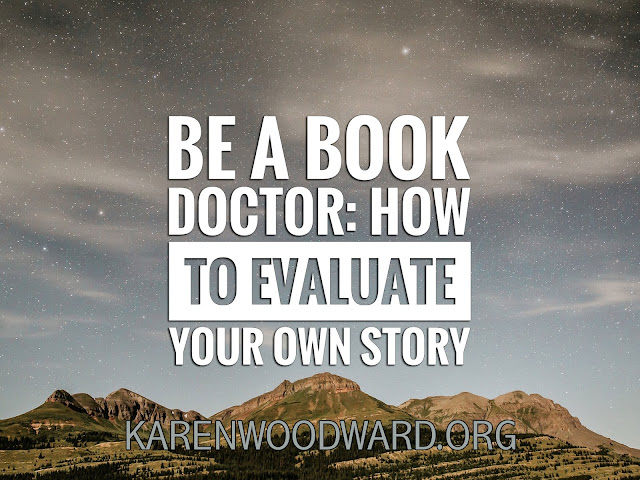Book doctors are wonderful. A book doctor is someone who isn’t your husband/wife/parent/friend, someone who can be objective toward your manuscript, someone who can dispassionately evaluate the content and structure of your story. And this can be an enormous help, especially at the beginning of your manuscript when you’re working on your story’s overall structure and shape.
But you don’t have to send your story off to someone else. You can be your own book doctor. How? The first step is to put your manuscript in a drawer and try to forget about it for a week or two. When you take the manuscript out of the drawer you’ll be able to see it more objectively.
There are a few stories I wrote so long ago that I no longer remember them. Reading them again was like reading the work of a stranger. It was painful but rewarding! At the time I wrote it I felt that something was off but I couldn’t put my finger on what exactly needed to be fixed. When I reread the story after a period of years I realized that the story had no midpoint, no crisis, no moment of revelation. The good news: as soon as I saw the structural defect it was surprisingly easy to fix.
So, if you don’t want to send your work off to a book doctor then put it in a drawer for a couple of weeks. Reread the manuscript through from top to bottom and ask yourself the following questions:[1]
Scenes:
- Does each scene have a goal and stakes? Does the main character want something in every scene, even if it is only a glass of water?
- Do you include sequels after the scenes? Or even mini-sequels between scenes (this works especially well if you have one scene per chapter).
Acts:
- Does each act have a main overriding goal and are the stakes spelled out?
Overall Structure:
- Is there a major turn/twist of the plot at the 25, 50 and 75 percent marks?
- Is there a clear Call to Adventure?
- Around the middle of the book—the midpoint crisis—the protagonist needs to understand the story world in a different light. Sometimes this information is about one of the characters—the love interest, the protagonist, the mentor, the protagonist’s helper—or about the Special World of the Adventure.
- Is the Special World of the Adventure strikingly different from the Ordinary World of the protagonist’s ordinary life?
- Is the protagonist locked into the quest by the 25 percent mark.
- Does the protagonist have an All Is Lost moment at around the 75 percent mark?
- Is there a race to the finish after the All Is Lost point and before the climax?
- Is it clear that the climax is a final test, one that at most one character can win?
- Are the stakes cashed out and all loose ends tied up before the story ends?
Protagonist:
- What state of affairs would make the protagonist happy?
- What danger/obstacle prevents the protagonist from achieving this happy state of affairs?
- Does the protagonist have a moral compass? Does the climax hinge on a moral issue? That is, does it hinge on a point of selflessness vs unselfishness? (Selfishness: Abandonment of conviction for the sake of personal advantage. Unselfishness: Adherence to principle despite the temptation of self-interest.)
- This is just something to think about, it’s not a hard and fast rule: Is the protagonist good but not the brightest penny in the jar or are they brilliant but morally flexible? It doesn’t always happen that the protagonist is one or the other, but there does seem to be a bit of a tradeoff between these two characteristics.
Every post I pick a book or audiobook I love and recommend it to my readers. This serves two purposes. I want to share what I’ve loved with you, and, if you click the link and buy anything over at Amazon within the next 24 hours, Amazon puts a few cents in my tip jar at no cost to you. So, if you click the link, thank you! If not, that’s okay too. I’m thrilled and honored you’ve visited my blog and read my post. :-)
A few months ago I read The 4-Hour Workweek by Tim Ferris. He is a master of telling folks how to make the most of their time. He helped me! In time for the holidays he's come out with another book: Tools of Titans: The Tactics, Routines, and Habits of Billionaires, Icons, and World-Class Performers. I haven't read it yet, but it's at the top of my to-be-read list.
Notes:
1. Many of these questions I’ve taken from Janice Hardy’s wonderful article: How to Be Your Own Book Doctor.

